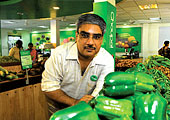 |
| I hope we don't have to
lug it back: Farmers waiting to sell their wheat at Khanna
mandi in Punjab |
Ihen
Jasmer Singh of Shahpura in Punjab comes to sell his wheat crop
at the agricultural market in Khanna, he puts forth his crop in
a heap for display. Subsequently, traders and buyers, usually
a handful of intermediaries, do a visual and tactile check of
the crop and offer a price. The price in case of wheat is linked
to the minimum support price (Rs 850 per quintal in this case)
announced by the government. The highest price of Rs 859 per quintal
is confirmed at this so-called 'auction' and the deal closed.
Khanna incidentally is the largest grain market in Asia. Last
financial year, 99,178 tonnes of wheat alone got traded in Khanna.
Khanna's auction pretty much sums up the
mode of price discovery across the agri-commodities in India.
This is, of course, a bulk dry commodity such as wheat for which
a fairly well functioning market exists. And till recently, trading
on wheat futures was also possible. Price discovery for perishables
or horticultural crops-fruits and vegetables-is even tougher.
PepsiCo India's Executive Director Abhiram Seth says, "It
is a challenge to sell even what is produced in trial fields.
The day we enter the market to sell, prices are down by half."
Why? The answer is disaggregated demand.
Simply put, when the large-sized produce arrives in the market,
there is no buyer with matching demand. So even if the economies
of scale are attempted, there is no market to receive it. As a
result, Pepsi resorts to selling its produce through the farmers
associated with it.
There is the additional problem of what World
Bank economists, Aaditya Mattoo and Ashish Narain, call the logistics
tax. In a recent report, they point out that a 20 per cent reduction
in transportation and logistics could drive down final prices
by as much as 12 per cent. "The sheer absolute cost of transport
is quite sensitive to scale and predictability of domestic supplies.
The emerging retail chains, especially the likes of Reliance Retail
with pan-India footprint, are expected to solve these problems
somewhat, yet the standards vacuum remains," they say.
Having to lug produce to mandis also increases
the number of times it is handled, leading to increased wastage.
On an average, there are six to seven handlings of horticultural
produce in the existing system that leads to 35-40 per cent of
produce going waste. Bharti Enterprises' Rakesh Bharti Mittal
points out that "if we just ensure that there is no wastage,
we can straightaway save $12 billion".
The constraints in the system aggravate the
pricing deficiencies. There is some movement forward, though.
The Agriculture Ministry is encouraging the private sector to
invest in modern terminal markets across the country. Meanwhile,
Mother Dairy Foods, part of the National Dairy Development Board,
has tied up with MCX-Financial Technologies for a national spot
market for perishables, including horticulture, floriculture,
and dairy products.
Terminal Markets
 |
| Open up: ITC's Sivakumar
is all for options trading |
The country's first modern terminal market
in Chandigarh is likely to be up and running shortly. The first
stage elimination of private investors has already happened with
four bidders having been shortlisted. These include a consortium
of National Agricultural Cooperative Marketing Federation of India
(NAFED), Bharat Hotels, Reliance, DSCL and commodity exchange
NCDEX.
These markets will provide under one roof
a wide range of facilities like grading and sorting line, electronic
auctioning, quality testing laboratories, cold storage and most
importantly banking facilities. Kalyan Chakravarthy, Country Head
(Food and Agribusiness), yes Bank, says that "terminal markets
will not just provide the farmers alternative channel for sale,
but will also be a boon for the modern retail chains as they will
get a graded, sorted, tested produce." yes Bank is a consultant
on the terminal markets project. Other states such as Maharashtra,
Andhra Pradesh and Tamil Nadu, too, are considering at least three
such markets.
The other key initiative is towards the evolution
of standards. To evolve standards for Indian varieties, the National
Institute of Agricultural Marketing (NIAM) is currently working
with USAID on a pilot project in three states to train the master
trainers. "We are working on three-four commodities in each
state and trying to document the Good Agricultural Practices (GAP)
in each of these commodities," says Anurag Bhatnagar, Director
General, NIAM.
Some good attempts are laced with enough
regressive action, though. Banning of futures in wheat and rice
is a case in point. While there is a case for banning of trade
in shallow spot market commodities, is there one in the case of
wheat? No. On the contrary, says S. Sivakumar, Chief Executive
(Agri Division), ITC, there really is a need for more sophisticated
instruments such as options to reach the benefits of commodity
derivate markets to the small farmers, given the vagaries that
afflict Indian agriculture. Farmers would agree.
|






